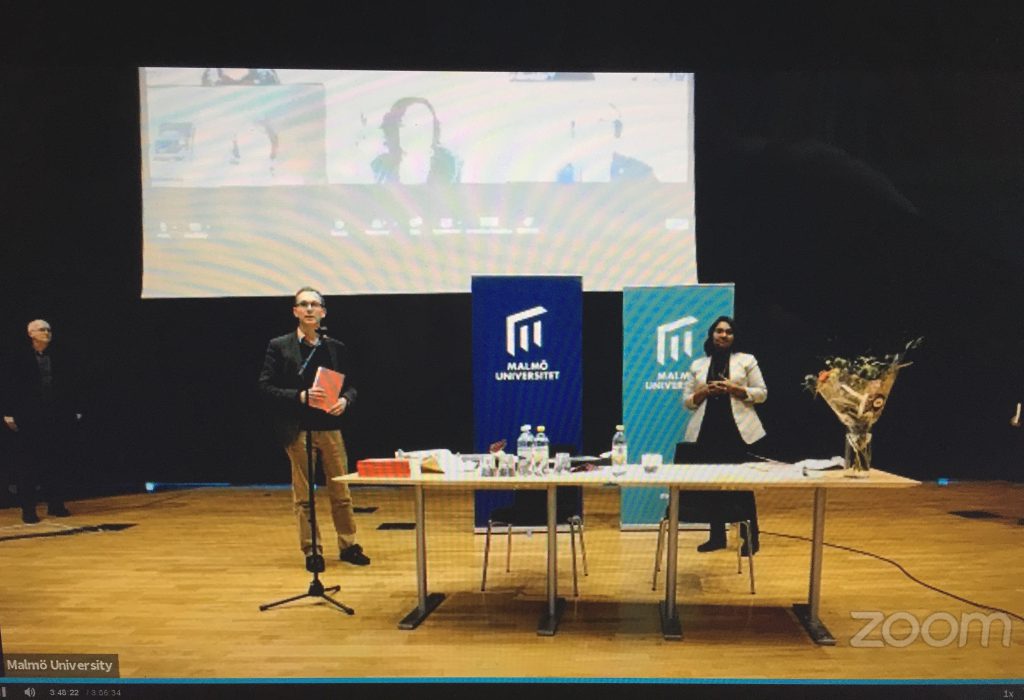Derek Hutcheson, Vice Dean for Doctoral Education, 8 March 2021
Almost exactly a year ago (5-6 March 2020), we held a residential course for doctoral students and their supervisors at Margretetorp, near Hjärnarp. The aim was to improve communication, reflect on the development of our doctoral education, discuss our doctoral courses, and provide mentoring and support for doctoral students and supervisors.
Though we did not realise it, it would turn out to be the last time all the faculty’s doctoral students and supervisors could be gathered together for some time. The previous week, news had reached us of the second case of Covid-19 in Sweden. But even at that stage, nobody expected the sudden transformation that would take place so quickly in the days following. A year on, most of our activities remain online, as we seek to minimise the spread of the pandemic. But the university’s life has continued apace despite the restrictions – and doctoral education is no exception.

From right to left: The doctoral candidate Anuradha Reddy, now Postdoc at K3, Derek Hutcheson, KS Vice Dean for Doctoral Education and Bo Reimer, Professor at K3.
Photo: Derek Hutcheson
Since we gathered in Margretetorp, six doctoral students have publicly defended their dissertations, as have the authors of two licentiate theses. Although the number of people present on-site has had to be reduced to a minimum, live online streaming has showcased our doctoral students’ research to the world. External opponents and examiners have joined us, albeit not in person, to participate in high-level scientific dialogues. The meaning of a ‘public defence’ has been redefined, with audience questions coming in from other countries and continents. This week, the Vice Chancellor passed a new decision concerning digital defence arrangements, which can be seen on the university’s homepage.
Recommendations regarding the coronavirus and COVID-19 | Staff (mau.se)
As with many other research activities in the university, many doctoral research projects have been hit by restrictions to planned fieldwork or lab work. Recently the university’s Advisory Committee for Research Education (KFU, in Swedish) published guidelines about how to minimise delays as a result of this. Now that the pandemic has gone on so long, it is important to adapt research designs to the new reality, to ensure that all our doctoral projects remain viable and still stand a good chance of being finished on time. For this reason, frequent dialogues between doctoral students, supervisors and the advisory committees of supervisors are crucial. It also remains important that doctoral students and supervisors ensure that changes to individual study plans are accurately documented.
We are now entering our second wave of ISP reviews under the new digital system. One crucial change this year is the greater degree of self-reflection required on the connection between doctoral study and the intended learning comes of the General Study Plans. Last autumn, many who were part of the first wave of digital ISPs found this a useful tool for better identifying and planning their needs in areas such as career development and conference participation. Individual study plans are part of the contractual framework of doctoral students’ work, as well as important tools for charting progression and structuring dialogue. Combined with collegial discussion, the process of ISP review should lead to improved quality in doctoral students’ outcomes and training.
On the subject of quality: next year the doctoral subjects in KS are scheduled to be among the first to be evaluated in the university’s doctoral quality evaluation. The evaluation process should allow us to reflect on and learn from each other’s experiences, as well as those of other faculties and universities. ‘Quality assurance’ is often seen as simply a bureaucratic process, but only if it is not used properly. Ultimately, we have to ensure things are done thoroughly, systematically, and consistently. Even in advance of a formal evaluation, these aims must be central to everything we do. In the coming months we will also be working to update and clarify our formal regulatory frameworks, to take account of changes in the structure of doctoral education.
My last entry on the KS blog was published on 25 January, the anniversary of the birth of Scotland’s national poet, Robert Burns (1759-1796). Burns once wrote, ‘Amid this mighty fuss just let me mention, The Rights of Woman merit some attention’. Today is 8 March, and the occasion of International Women’s Day thus gives me the perfect opportunity to continue the tradition of ending the doctoral education news with some Scottish poetry!
Read more about the Vice Chancellor’s new decision concerning digital defence arrangements.
Link to the document in Box.
Link to the information on the university’s homepage
